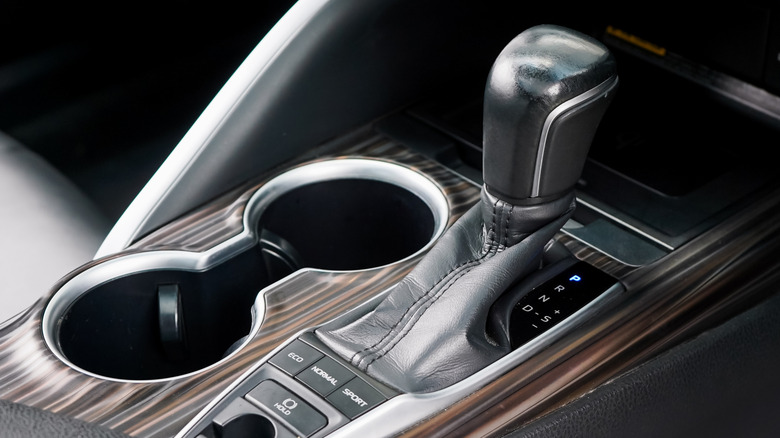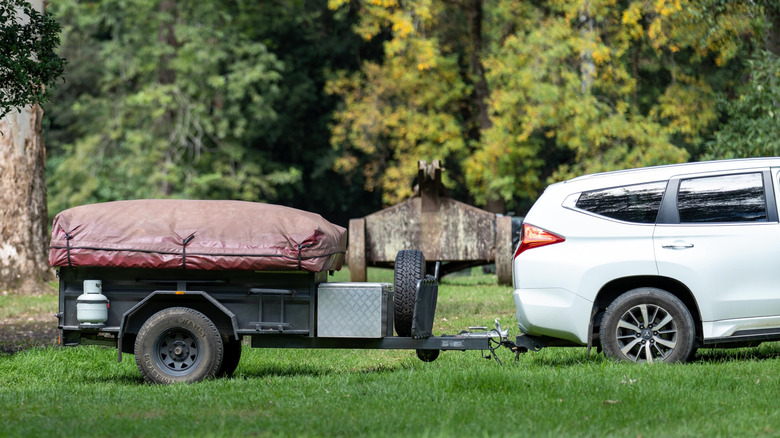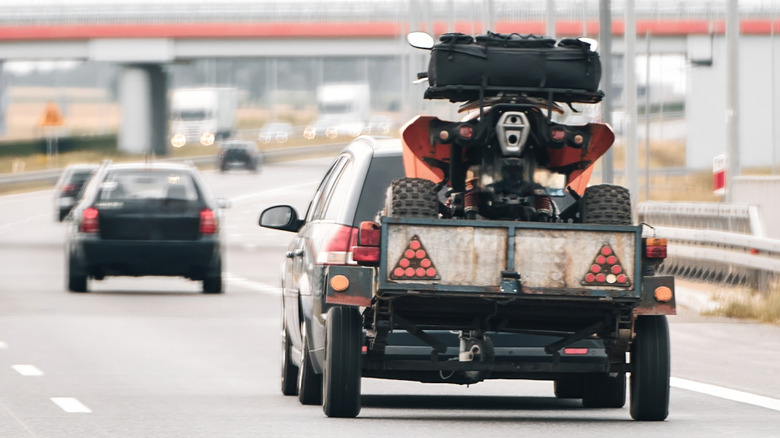Does Towing Damage An Automatic Transmission?
For many outdoor enthusiasts, towing a camper always looks like an easy task — just hitch up your trailer and go to the nearby campground. However, the reality is far more complicated, as there are many things to consider for safe and effective towing. Sure, necessities for towing include having a truck with a powerful engine and a strong frame. But you should also consider the transmission type, as it plays a crucial role in determining how much your vehicle can pull.
Unlike the past, where vehicles with stick shifts were the norm for towing, automatic transmissions are becoming increasingly common for towing. After all, they are far easier to drive and offer a smoother driving experience than their manual counterparts. Plus, they are the best for taking on hilly terrain. Unfortunately, there are some drawbacks that you should note, especially if you are planning to pull a camper with your vehicle.
For one, automatic transmissions are usually more mechanically complex compared to manual transmissions. This means they have a shorter lifespan, and their maintenance is more frequent. Furthermore, any damage caused during towing — such as burnt-out clutches and slipping gears — can leave you with thousands of dollars in repairs or replacements. With that said, it's best to understand how towing a trailer can affect your transmission system, and how to protect it.
How does towing affect your vehicle's automatic transmission
At first glance, a truck with an automatic transmission might seem like it can handle anything, especially if it's one of the trucks with the best towing ratings. However, even with massive power under the hood and rugged engineering, pulling a camper can still harm your vehicle's transmission system. For instance, when you ask a car to tow beyond its towing capabilities — say, pull a 6,000-pound trailer with an SUV rated for only 5,000 pounds — over long distances or in hot weather, the transmission fluid temperatures will spike. Once that happens, fluid will break down, losing its ability to cool and lubricate internal components.
At first, you might not notice the effects of bad transmission fluid. However, some crucial components will gradually wear out over time, resulting in worn-out clutch packs and damaged torque converters. Worse still, your transmission's gears may warp or crack due to overheating, and this might lead to complete transmission failure. And unlike replacing an air filter or a battery, a bad transmission isn't an easy fix — repairs can range from $900 for minor fixes, to over $10,000 for total replacements. Improper towing can also affect your car's braking system and tires as well.
How to safely tow with an automatic transmission
How you tow a trailer can make all the difference between a costly visit to the mechanic and a safe trip. If you plan to pull a heavy camper, your very first step should be to check your vehicle's owner's manual. Some automakers usually offer information on how to hitch a trailer, potential limitations, gear recommendations, and specific towing capacities.
Beyond the manual, you should consider your driving habits that might harm your transmission. When pulling a heavy trailer, it's best to avoid aggressive acceleration and sudden braking. You also want to use low gears when climbing and descending steep hills to reduce stress on the transmission.
Another preventative measure you should take when towing with an automatic transmission vehicle is to visit a mechanic for routine inspections. You can even do it yourself, provided you have the knowhow to check the transmission fluid. In addition, check for leaks — and, if needed, change the oil and air filters. Remember that dirty or low fluid will not effectively lubricate and cool the system, and will ultimately need to be topped off or replaced.
Also, consider upgrading your vehicle's performance by installing a transmission cooler. This add-on will make all the difference in protecting your transmission system from overheating, especially if you are used to towing heavy loads frequently and covering long distances. However, a transmission cooler is not a necessity for light towing (like hauling an ATV across town, or a small boat), especially if you're towing under the manufacturer's tow rating.


